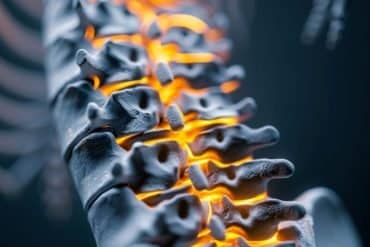Summary: Chronic gut inflammation can trigger the clumping of alpha-synuclein in the walls of the colon, a new study reports. Researchers found chronic inflammation in the gut during early life can exacerbate the clumping of alpha-synuclein in the brains of older mice. The findings add to a growing body of evidence which links gut health to Parkinson’s disease.
Source: Van Andel Research Institute
Chronic inflammation in the gut may propel processes in the body that give rise to Parkinson’s disease, according to a study by scientists at Van Andel Institute and Roche.
The study, published in Free Neuropathology, is the latest in a growing list that links the gut and the immune system to Parkinson’s. The researchers’ findings in an experimental mouse model of gut inflammation track with several large-scale epidemiological studies that show an association between Parkinson’s and inflammatory bowel diseases, such as ulcerative colitis and Crohn’s disease.
Epidemiological evidence from other groups indicates the risk of developing Parkinson’s fades in certain people whose inflammatory bowel disease is treated with anti-TNF, a standard-of-care anti-inflammatory therapy, which suggests that reducing gut inflammation may have promise for mitigating Parkinson’s onset.
“There is increasing evidence that changes in the gut can affect a variety of neurological and psychiatric brain disorders,” said Patrik Brundin, M.D., Ph.D., VAI deputy chief scientific officer and co-corresponding author of the study.
“Parkinson’s is a complex disease with a wide range of factors that work in concert to spark its onset and progression. We need to understand the gut’s likely influence on Parkinson’s development better. This study provides novel insights, and this new knowledge can facilitate the development of improved treatment approaches.”
In their disease models, the team found that chronic gut inflammation triggers a protein called alpha-synuclein to clump together in walls of the colon, as well as in local immune cells called macrophages.
A similar process may play out in the colons of some people — such as those with inflammatory bowel diseases — thereby increasing their risk to develop Parkinson’s as shown in studies by other groups.
Similarly, in the brains of people with Parkinson’s, “sticky” alpha-synuclein aggregates also develop. For reasons that still are unclear, these aggregates can clog the molecular machinery that keep neurons alive.
The resulting loss of some of these critical cells — and the chemical messenger they produce called dopamine — causes Parkinson’s hallmark movement-related symptoms, such as freezing and loss of voluntary movement.
The additional wide-spread development of alpha-synuclein aggregates throughout the brain also may be associated with the disease’s non-motor symptoms and may fuel its progression, which cannot be slowed or stopped with existing treatments.
The study also revealed that chronic inflammation in the gut early in life can exacerbate alpha-synuclein clumping throughout the brain in older mice. While it isn’t clear exactly how this happens, the team has two theories: first, they suggest inflammatory chemicals may travel from the gut to the brain via the bloodstream, triggering a runaway inflammatory immune response that leads to protein aggregation.
Another idea is that alpha-synuclein aggregates may travel to the brain via the vagus nerve, one of the longest nerves in the body and a “superhighway” between the gut and the brain. Once there, the proteins may then execute their toxic activity in the brain.
“We now know that systems throughout the body contribute to Parkinson’s,” said Emmanuel Quansah, Ph.D., a postdoctoral fellow in Brundin’s lab and a key contributor and co-author of the study.

“It was striking to see protein aggregation pathology in the brain that mirrored pathology in the colon brought on by inflammation. A particularly intriguing observation was the loss dopamine-producing nerve cells — which play a major role in Parkinson’s onset — in our models that had gut inflammation a year-and-a-half earlier.”
Notably, the team also found that modulating immune activation in the colitis mouse model by genetic or therapeutic means tuned the level of alpha-synuclein clumps in the colon up or down.
“Our results in mice, together with the genetic and epidemiological data by others in humans, make a strong case for further exploring systemic immune pathways for future therapies and biomarkers for Parkinson’s,” said Markus Britschgi, Ph.D., Senior Principal Scientist and Section Head in the Neuroscience and Rare Diseases Research Department at the Roche Innovation Center Basel and co-corresponding author of the study.
Authors include first author Stefan Grathwohl, Ph.D. (previously a Roche postdoctoral fellow), Nazia Maroof, Ph.D. (previously a Roche postdoctoral fellow), Liz Spycher, Krisztina Oroszlan-Szovik, M.S., Helga Remy, Markus Haenggi M.S., and Marc Stawiski of Roche Pharma Research and Early Development, Neuroscience and Rare Diseases Discovery and Translational Area, Roche Innovation Center Basel; Jennifer A. Steiner, Ph.D., Zachary Madaj, M.S., and Martha L. Escobar Galvis, Ph.D., of VAI; Fethallah Benmansour, Ph.D., of Roche Pharma Research and Early Development, pREDi, Roche Innovation Center Basel; Gonzalo Duran-Pacheco, Ph.D., Juliane Siebourg-Polster, Ph.D., Matthias Selhausen, Pierre Maliver, EVCP, Arel Su, DVM, and Annika Herrmann, DECVP, of Roche Pharma Research and Early Development, Pharmaceutical Sciences, Roche Innovation Center Basel; Andreas Wolfert and Thomas Emrich, Ph.D., of Roche Pharma Research and Early Development, Pharmaceutical Sciences, Roche Innovation Center Munich; and Christoph Mueller, Ph.D., of Institute of Pathology, University of Bern.
Funding: Research reported in this publication was funded by Van Andel Institute and Roche. Early work on this project was supported in part by the European Research Council.
About this Parkinson’s disease research news
Source: Van Andel Research Institute
Contact: Beth Hinshaw Hall – Van Andel Research Institute
Image: The image is in the public domain
Original Research: Closed access.
“Specific immune modulation of experimental colitis drives enteric alpha-synuclein accumulation and triggers age-related Parkinson-like brain pathology” by Grathwohl, S., Quansah, E., Maroof, N., Steiner, J. A., Spycher, L., Benmansour, F., Duran-Pacheco, G., Siebourg-Polster, J., Oroszlan-Szovik, K., Remy, H., Haenggi, M., Stawiski, M., Selhausen, M., Mailver, P., Wolfert, A., Emrich, T., Madaj, Z., Su, A., Escobar Galvis, M. L., Mueller, C., Herrmann, A., Brundin, P., & Britschgi, M. Free Neuropathology
Abstract
Specific immune modulation of experimental colitis drives enteric alpha-synuclein accumulation and triggers age-related Parkinson-like brain pathology
Background: In some people with Parkinson’s disease (PD), a-synuclein (αSyn) accumulation may begin in the enteric nervous system (ENS) decades before development of brain pathology and disease diagnosis.
Objective: To determine how different types and severity of intestinal inflammation could trigger αSyn accumulation in the ENS and the subsequent development of αSyn brain pathology.
Methods: We assessed the effects of modulating short- and long-term experimental colitis on αSyn accumulation in the gut of αSyn transgenic and wild type mice by immunostaining and gene expression analysis. To determine the long-term effect on the brain, we induced dextran sulfate sodium (DSS) colitis in young αSyn transgenic mice and aged them under normal conditions up to 9 or 21 months before tissue analyses.
Results: A single strong or sustained mild DSS colitis triggered αSyn accumulation in the submucosal plexus of wild type and αSyn transgenic mice, while short-term mild DSS colitis or inflammation induced by lipopolysaccharide did not have such an effect. Genetic and pharmacological modulation of macrophage-associated pathways modulated the severity of enteric αSyn. Remarkably, experimental colitis at three months of age exacerbated the accumulation of aggregated phospho-Serine 129 αSyn in the midbrain (including the substantia nigra), in 21- but not 9-month-old αSyn transgenic mice. This increase in midbrain αSyn accumulation is accompanied by the loss of tyrosine hydroxylase-immunoreactive nigral neurons.
Conclusions: Our data suggest that specific types and severity of intestinal inflammation, mediated by monocyte/macrophage signaling, could play a critical role in the initiation and progression of PD.






